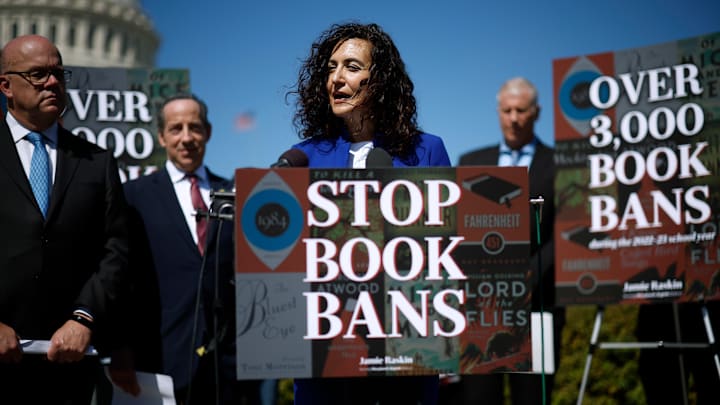It's Banned Books Week, and it's been a week of historic devastation, from Hurricane Helene's destruction to the heartbreaking passing of Hollywood icon Maggie Smith. Potter fans know her as Professor McGonagall.
Banned Books Week. It's a time to thump your nose at literacy terrorists who think it's appropriate to tell individuals what they can and cannot read. The best way to support books that have been banned is to read as many of them as you can and tell everyone else to do the same.
What are banned books?
Banned books are books that have been removed from general access to the public, such as libraries and schools. You may also find these books difficult to buy at some bookstores. The requirements for a book to get banned aren't as strict and moral as you would assume. A book doesn't have to be an evil manifesto inciting evil doings.
Topics of banned books often include mentions of religion, sexual content, racism, and LGBTQ. Books that challenge authority, government, or societal structure are also often challenged and feared.
Some of the greatest literary works have been listed as " forbidden to read" books and removed from libraries—often at schools. Thousands of books were banned from schools and libraries during the 2023-2024 year.
Why is banning books bad?
However, the action of censoring books in general raises questions. To tell people that they can't read something because it might cause a reaction means we're doubting humanity's ability to make good decisions. To think for themselves. To decipher fact from fiction.
So, explain to this dense readaholic how a fictional kid's novel about wizards and magic is a risk to our children and future generations. If you're confused, I'm referring to the ongoing ban attempt on YA fiction Harry Potter novels. The entire series has become a cult classic film franchise that has created fanatics across the globe. However, it has also inspired numerous protests and bans as people try to restrict purely fictional books based on religious claims.
But if we ban a book series based on its use of magic and fantasy because it offends a subset of the population, at what point do we stop? Why does one set of people think they have the power to keep literary works from others?
What books have been banned?
Potter author J. K. Rowlings isn't the only fictional writer who's been on the receiving end of zealous censorship creeps. There are reading rebels like myself who prefer to break the rules. So banning a book is a great way to inspire us to give it a read, especially during Banned Book Week.
We've also seen bans and book challenges for books like Fifty Shades of Grey (E. L. James), which has its history of controversy, The Hunger Games, To Kill a Mockingbird, Of Mice and Men, The Adventures of Huckleberry Finn, Goosebumps, The Catcher in the Rye, and The Color Purple. If you're pre-Y2K like this Xennial, most of the books were part of your school curriculum. So the fact that they've been restricted from schools and libraries is majorly concerning.
Should we restrict the books our youth read?
While it's normal to have restrictions on the materials we allow our youth to access, it's a fine line that gets murky when you factor in things like personal beliefs, religious views, and the age-old debate of nature versus nurture.
What would be acceptable for some people might not considered appropriate for others. As an example, all four of my children have read Harry Potter. And I've might not be appropriate for others. For example, all four of my children have read Harry Potter, and I've introduced them to banned classics like Huck Finn and Mockingbird.
Because our younger generations need to understand powerful writing. Words that make you think. That makes you question life and your place in it. We're seeing a depressing amount of younger adults and adolescents with no desire to ask why. If you tell them the sky is green, they'll believe it's green. They won't look up to check for themselves. They wouldn't research if it was possible or if it was an anomaly. It seems like so much focus is going into trying to make sure our kids are safe that we're overdoing it to extreme measures. When we allow the few to control the actions of all, we're doing an injustice to everyone.
Banned books should be read
While there are hundreds of things to terrify parents, books should not be on the list. We should be encouraging the younger generations to spend less time on their devices and a bit more inside a book. When readers turn to a book, they can discover new places, make new friends, learn about new cultures, and find themselves. If we allow anyone the power to limit what we read, we're giving up control of our imaginations. And that is a very dangerous thing. Because then no one dreams of anything new.
Keep your imagination healthy and free by adding some banned books to your reading list. There are still a few months left in 2024 to complete any reading challenges you've joined. As is normal for me, I've completely failed at my insane yearly goal of reading 100 books in one year. Am I the only one who repeatedly fails at the goals I set because I'm too ambitious while being too busy? Or do you also have failure-to-launch syndrome when it comes to your goal list? I'd love to hear your story in the comments.
